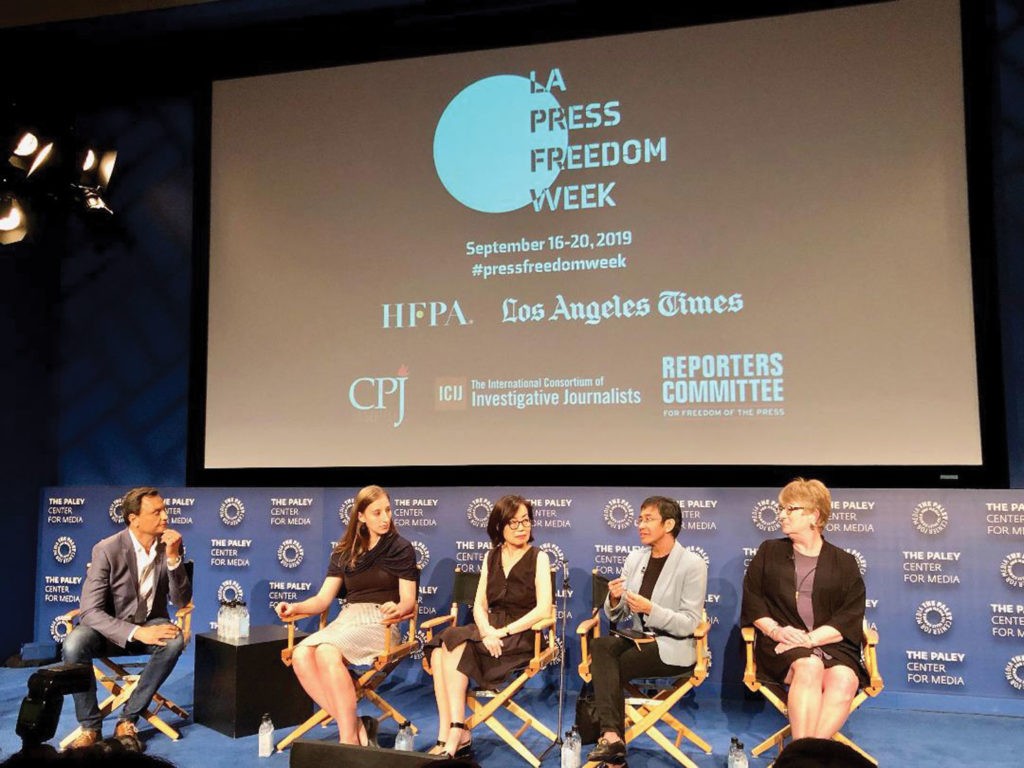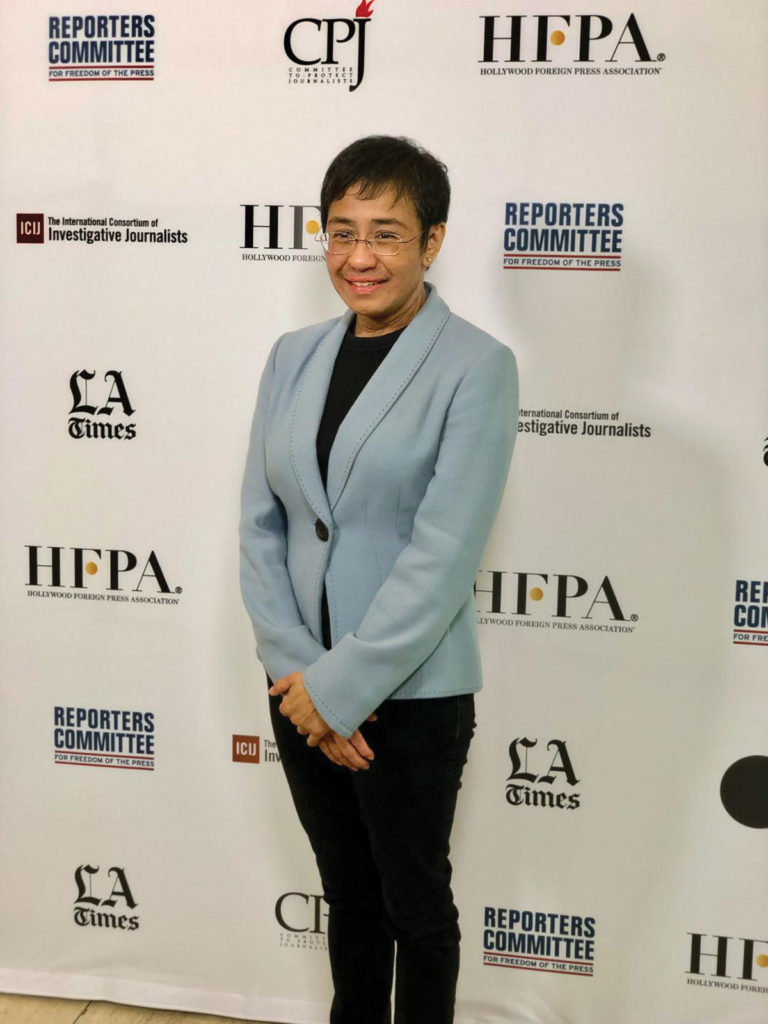
Rappler CEO and Executive Editor Maria Ressa lamented use of social media to spread misinformation and contribute to the ‘erosion of democracy’ as evidenced in recent elections, such as those in the Philippines and the United States, during a panel for Los Angeles Press Freedom Week on Monday, September 16.
Ressa, TIME’s 2018 Person of the Year and a staunch critic of Philippine President Rodrigo Duterte’s administration, co-founded digital news site Rappler back in 2012, which has relied on the power of social media and crowdsourcing information for news stories.
She, however, has observed the shift in technology years later, with certain platforms like Facebook and Twitter overtaking legacy media outlets in as news and information distributors.
“But they left behind the gatekeeping powers of news organizations, which means the way the system is designed, this attention economy, is that lies laced with anger and hate spread faster and further than those boring facts…I think that’s the core of the erosion of democracy,” Ressa told a packed audience at the Paley Center for Media in Beverly Hills, California during a “Press Freedom and Elections” panel.

The event kicked off a weeklong series, hosted by the Hollywood Foreign Press Association (HFPA) and the Los Angeles Times, focused on press freedom and the First Amendment around the city.
Ressa was joined by Los Angeles Times Deputy OP-ED Editor Terry Tang, Committee to Protect Journalists board chair Kathleen Carroll and Direkt36 investigative journalist Blanka Zoldi of Hungary, as Ramzy Malouki, LA correspondent for French TV channel Canal+ and a member of the HFPA, moderated.
Tang also agreed on social media platforms’ stripping of the gatekeeper function and that at the end of the day, there are certain skills and judgments that journalists have over other internet users and aggregators.
“The [journalism] industry itself is obviously changing a lot. But the skills you need, that’s not going to change,” she said.
Carroll added that newsrooms should “invest more” in fact-finding and reporting that is relevant to their audiences.
“You can’t just show up and record what happened and sort of regurgitate that into the paper. You have to bring something and I think audiences appreciate it when you’re doing something on their behalf, when you’re finding things out that they didn’t know, when you are advocating for them by finding out how their taxes were being spent, or you’re uncovering corruption,” she said, adding “that’s where our profession will thrive and it’s the rock we stand on.”
The panelists also touched upon safety of media practitioners on the job and what needs to be done to reconcile the threats to free press and fair elections in coming years.
“You cannot have election integrity if we do not have free will, and that’s the biggest question now the technology poses for us,” Ressa said. “So free press, yes, we will fight on the front lines. But we need to fight this whole new sphere that has triggered this deterioration of democracy, that triggered the elections of Duterte or Putin.”
Janet Nepales, treasurer for the HFPA and columnist for Manila Bulletin, closed the night sharing her own experiences as a reporter in the Philippines during the Marcos era.
“Early on as a reporter, I learned the value of not being afraid to stand for what is right, to speak your mind and do what you think is right even if it means losing a lot. Because what matters in the end is that you know deep in your heart, you did what you were supposed to do, to write the truth, to speak the truth, and to do what a true journalist is supposed to do. Because without truth, what are you a journalist for?” Nepales said.
PH as a ‘petri dish’
In the past year, Ressa and Rappler face 11 complaints and cases as of July, including questions on the site’s ownership, tax violations and cyber libel.
“Shine the light. Call the spade a spade. It’s not a coincidence that in a little over a year, 11 cases and investigations have been filed against me and Rappler. The only thing I’ve done is to be a journalist,” Ressa told the Asian Journal in an interview on Monday when asked why she continues her fight amid the cases.
The Filipina journalist has been arrested twice earlier this year and has had to post bail eight times in a three-month period.
Her advocacy for press freedom has gained international attention, even garnering the honor as as a Fellow of Society, the highest honor by U.S.based organization, the Society of Professional Journalists, earlier this month.
However, she implored Filipinos, especially those in America, to pay attention and that they have a right to speak out against what’s going on back in the Philippines.
“Filipino Americans belong in two different countries and two different worlds that are both in trouble. What I’ve learned through all of this is that the time to ring the alarm is when you are still strong enough to fight for your freedom and that’s even more important in the Philippines than in the United States,” she said in her Asian Journal interview on Monday.
She cited an interview she did with Cambridge Analytica whistleblower Christopher Wylie during which he admitted that the Philippines was a test ground for the company to experiment certain social media and propaganda tactics because of its underdeveloped infrastructure and lack of strict cyber laws.
“They tested these tactics in our country, the petri dish — those were his exact words. If it worked, then they hoarded it over to the west. Understand that we no longer live in a local landscape, global is local and local is global,” she said, positing that this is a new form of ‘digital colonialism’ that hinders healthy civic engagement. “We must understand that we’re being actively manipulated. It is insidious on social media…Unless we significantly change it, this is leading to a dystopian future, a dystopian present and you’re seeing it happen in the Philippines.”
Ressa was also a speaker alongside CPJ Executive Director Joel Simon on Tuesday morning in a “Dictators and Disinformation: A Discussion on the State of Press Freedom” discussion moderated by Sewell Chan, LATimes deputy managing editor for news.
The weeklong press freedom series was held in collaboration with the Committee to Protect Journalists, International Consortium of Investigative Journalists, and the Reporters Committee for Freedom of the Press.






